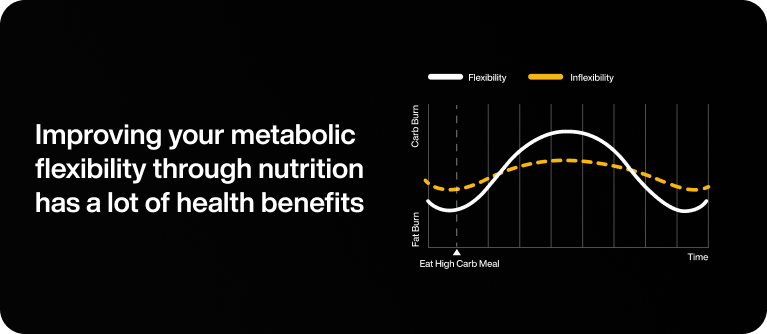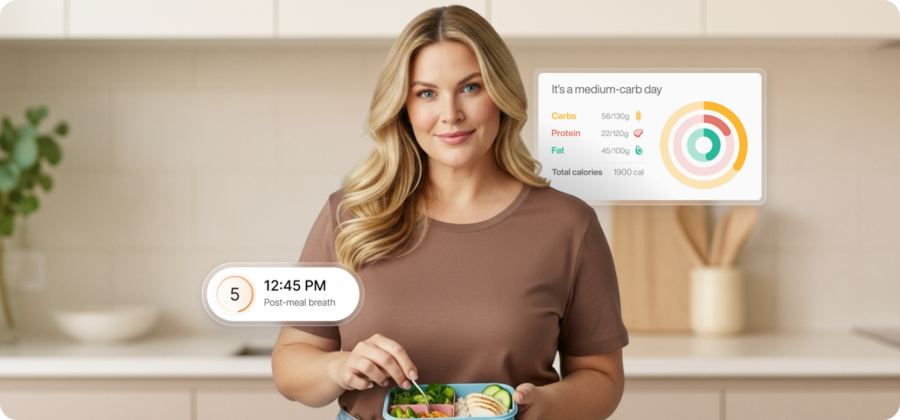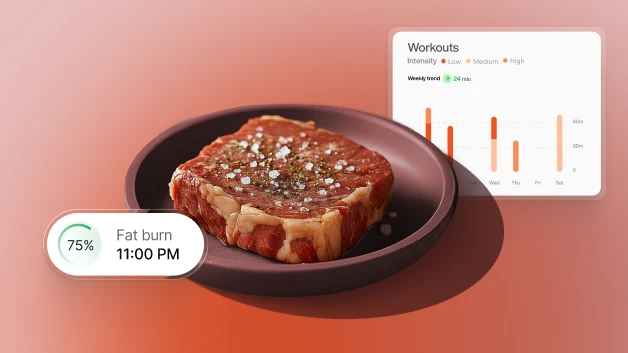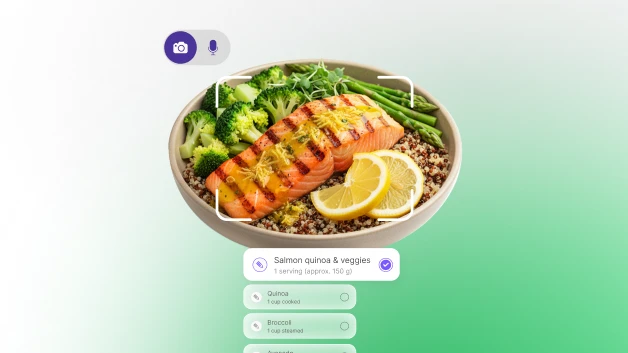Eating out the healthy way

Take the guilt out of eating out
Eating out can be a delightful experience, especially when you are with friends and family. But even if you're doing everything right at home, it can be challenging to stick to your healthy eating habits when dining out.
Making the right nutritional choices for your diet when going out can make the experience more fun and easy-going - if you know how to prepare.
While eating out can be quick and convenient, the average American doesn’t eat a very healthy diet. Did you know that restaurant meals account for 21% of their daily caloric intake? At full-service restaurants, roughly 50% of the meals served are considered poor nutritional quality, and the same goes for 70% of fast food meals1. More importantly, unhealthy eating habits may increase your risk of developing metabolic syndrome and lead to poor health risks and outcomes.
What can you do?
Healthy eating habits and optimal meal timing are the keys to achieving weight loss. While it’s easily said and done, healthy eating on the go can present unique challenges.
To set the stage for healthy eating habits and sustainable weight loss, you need to get to know your metabolism - the engine of your body. Our metabolism is integral to our health because it determines how we use the energy from the food we eat. It also affects everything from our weight and energy levels to our athletic performance and overall well-being.


With a solid game plan for navigating the menus and making informed choices about what to eat, you can support your metabolism rather than hinder it. By first assessing your metabolic health, you will understand what impact your current habits have on your body, what changes you need to make to reach your health goals, and land on a personalized nutrition plan that fits your physiology.
Maintaining metabolic health while eating out
No matter what your goal is - whether it be weight loss, fitness, or more energy, your metabolism lies at the core of how your body functions. Achieving metabolic flexibility is an important component of supporting a healthy metabolism, and making healthy choices when dining out can play a key role in this process.
Metabolic flexibility refers to the ability of the body to efficiently switch between using glucose (sugar) and fat for energy, which is important for maintaining a healthy weight and preventing chronic diseases such as high blood pressure, high cholesterol, type 2 diabetes, and other high-risk conditions.


The good news is that a healthier, more flexible metabolism will make it easier for you to reach your health goals.
By following daily nutritional recommendations, you can hack your body’s ability to utilize different sources of fuel for energy and, over time, provide your body with the tools it needs to keep active, energetic, and happy.
How to Eat Out Healthy
Choosing the restaurant
With endless options and cuisines available, it’s easy to tilt to our temptations and undervalue how important the food we eat is for our bodies. The first step to eating out while supporting your metabolism is to integrate a personalized nutrition plan to familiarize yourself with what foods your body needs to shift from carb burn to fat burn. The second step, when it comes to dining out, is to choose the right restaurant that can cater to those needs (when it’s in your control).
One way to support metabolic flexibility is to look for restaurants that offer healthy options. The more you learn which healthy foods are good for your body, the easier your healthy eating habits will become. You can find cheatsheets of food lists, like this one, on the Lumen app. Choose foods that are nutrient-dense and low in added sugars. These include lean proteins, whole grains, and vegetables. Additionally, incorporating healthy fats such as avocado or nuts into meals can help promote metabolic flexibility by providing the body with an alternative source of energy.

Whether going through a drive-thru or sitting down at a restaurant, you will likely be surrounded by tempting choices that will not support your metabolism. In addition, you might be unaware of everything that goes into a dish, dessert, or beverage because you are not preparing the meal yourself at home.
While many restaurants give you a general idea of what ingredients are used, they likely add others to make everything taste as flavorful as possible. This means ingredients like extra oils, salt, and sweeteners. It's out of your control, but you can minimize any risk by choosing healthier options and avoiding foods that tend to be fried and artificial.
"The combination of metabolic feedback and daily plans Lumen gives me a structure to work to enabling me to fuel the best for my daily requirements"
Maria, England
Plan ahead
Maintaining a healthy metabolism while eating out is more than possible! Before heading out to the restaurant, take a few minutes to plan your meal. Taking a breath measurement before heading out can help steer you toward making an informed choice on whether you have space for more carbs or whether your body needs healthy proteins and fats. Preparing and planning ahead will allow you to enjoy your meals even more because you know you are working on boosting your metabolism while simultaneously having a great time with family or friends.

Look up the restaurant's menu online and choose healthy options that support your metabolism. You can also ask the server for recommendations or if they can accommodate any dietary restrictions. Making smart eating choices to support your body and health involves choosing high-protein and low-calorie foods that are nutrient-dense.
Drinking plenty of water rather than other beverages that are high in sugar and artificial flavors is also a great route to take!
“Having a plan in place to support your metabolism while eating out will make things much easier and result in better decisions when choosing your meal.”
Marine Melamed, Certified Nutritionist at Lumen
Control your portion sizes
Another way to support metabolic flexibility when eating out is to be mindful of portion sizes. Restaurant portions are notoriously large and often much larger than what the body actually needs. Portion control plays a significant role in maintaining a healthy weight. When we eat the appropriate amount of food, our body is better able to digest and absorb nutrients effectively. This means that we are more likely to feel satisfied and less likely to overeat.
Overeating can contribute to weight gain and disrupt metabolic flexibility. Sharing meals, taking leftovers home, or ordering smaller portions can help prevent overeating and support a healthy metabolism.
Moreover, portion control can help us create a calorie deficit, which is necessary for weight loss. By consuming fewer calories than our body requires, we can effectively manage our weight and reduce the risk of obesity.
Making substitutes and modifications
Healthy eating habits doesn’t mean depriving yourself of pleasurable foods. However, if you desire something that is a bit on the unhealthier side, you can limit the amount you eat, or make substitutions and modifications. For example, while a salad will be packed with nutrients due to the various vegetables it contains, it may be low in protein and high in calories. When you get into the habit of accurately tracking your food intake and how certain foods make you feel, you will be more in tune to look at a menu and spot exactly which meal is good for you.

Try asking for the dressing on the side, as that alone could be equivalent to the calories of the salad itself. You can also request they add a protein source like salmon or chicken to help meet your macros.
Another example would be asking for anything typically fried to be grilled or baked instead. This reduces the amount of oil used and, therefore, the number of calories you will end up consuming. Consider these points for eating healthy when out:
- Avoid ordering fried foods
- Request to have sauces and dressings on the side to control calorie intake
- Add extra protein sources like chicken, salmon, and beans to your meal to boost your energy levels and metabolism
“After trying to lose weight for years, I’m so excited to have found a tool that lets me eat normally and still feel healthy and lose weight.”
Lisa, Switzerland
Low-Carb Fast Food Options When Eating Out
If you are following a low-carb diet, weight loss may be one of your primary goals. A fast metabolism is helpful for weight loss because you can eat more calories and feel satiated while losing weight; if your metabolism was slower, you would need to eat fewer calories to be in the proper caloric deficit. It is also important to include carbs in our diet so that our body knows how to use them for energy without storing them as body fat.
Consuming a balanced amount of quality carbohydrates, such as whole grains, fruits, and vegetables, helps our body use them for energy and improves our metabolic health.
However, watch out for overconsumption of low-quality carbohydrates, such as junk food and sweets. These can have negative effects on our health and weight management.
When we consume excessive amounts of carbs, our body relies on them as its primary source of energy, leading to decreased sensitivity to insulin and, eventually, insulin resistance. This can result in high blood sugar levels, increased fat storage and weight gain, and the release of harmful toxins into the body.
Eating out tips according to our Lumen experts:
Skipping the bread basket
Many restaurants offer a complimentary bread basket, but it's best to skip it. Bread and other refined carbohydrates can cause a spike in blood sugar, which can slow down your metabolism. Instead, opt for a healthy appetizer, such as grilled vegetables or a shrimp cocktail.
Choose lean proteins
Protein is an essential nutrient that helps support a healthy metabolism. When dining out, choose lean protein sources, such as grilled chicken, fish, or tofu. Avoid fried or breaded options, which can be high in calories and unhealthy fats.
Load up on vegetables
Vegetables are a great source of fiber and antioxidants, which can help support a healthy metabolism. When dining out, choose dishes that are loaded with vegetables, such as a stir-fry or grilled vegetable skewers. You can also ask for extra veggies on the side. Use this food list cheatsheet to guide your choices.
Be mindful of your beverages
Beverages can be a hidden source of calories and sugar, which can slow down your metabolism. Avoid sugary drinks, such as soda or sweet tea, and opt for water or unsweetened iced tea instead. You can also add a squeeze of lemon or lime for extra flavor.
It's a journey, not a sprint
Eating out doesn't have to mean sacrificing your eating habits. You can still support your metabolism with consistency and awareness of your choices. If you indulge in a dessert one night, it won't break the cycle. Making sure you're still integrating movement and quality sleep into your routine as well as following your personalized nutritional guide every day, will help you stay on track.
"What I love most about Lumen is that I know that there's gonna be a day that I can eat a plate of pasta and not feel bad about it and know that it's actually going to be doing me a favor that day and not holding me back from reaching my goals"
Robin, Chicago
Eating Out Tips to Help Keep You On Track
Be prepared before dining out
Knowing where you are going and figuring out how to enjoy yourself while still supporting your health can make things a lot easier than just showing up at a restaurant and coming up with a plan spontaneously. Take a breath measurement 30 minutes before going out. This way you'll be able to determine in real-time whether you are in fat burn or carb burn. This indication will give you insights into how much of each macro you should eat at that meal. This will help you remain consistent in your eating habits.
"Be open to testing your metabolism - it is the first step for making a significant change towards your goals. Whether you're following a diet or specific eating pattern, or if your goal is to improve body composition, knowing what works for you the best will help you to adjust your journey to make better decisions."
Marine Melamed, R.D. Nutritionist at Lumen
Research menus for healthy eating out options
Once you have the restaurant figured out, find their menu on their website. This is an essential tip for being prepared; being able to see your options ahead of time allows you to walk through the door knowing what you want to order to continue to support a healthy metabolism. The more you know about your body, the better prepared and equipped you will be when it's time to order. Be sure to look at appetizers, drinks, and desserts in addition to the main course you will enjoy. Also, it doesn’t hurt to have a backup plan in case they are out of something!
Top Healthy Eating Out Tips - According to Lumen Experts
- Prioritize low-carb options and skip the tortillas, bread, pasta, and processed grains
- Choose water, tea, and coffee to avoid hidden carbs in beverages
- Aim to make your meals as high-protein as possible to support your metabolism
- If you are plant-based, you can still make your meals high-protein through foods like beans, seitan, and tofu
Eat mindfully
When you eat mindfully, you take your time and chew your food slowly. This allows your brain and stomach to connect, and you can have a greater understanding of when you are full. By preventing overeating, you consume fewer calories and support your metabolic health. One of the biggest contributors to obesity is high stress because it changes our appetite, stimulates overeating, and makes us more insulin-resistant, a factor that elevates blood sugar and may put us at risk for Type 2 diabetes2.
Don't forget that timing your meals correctly will also help you sleep better. Consuming your carbs earlier in the day and having a lighter dinner 2-3 hours before bed can help you sleep better and shift to fat burn overnight.
Wrap up
Eating out doesn't have to mean sacrificing your healthy eating habits. It is more than possible to eat healthy to support your metabolism if you are aware of hidden ingredients and have a plan going in! Prioritizing lean protein sources and veggies, sticking to water and other zero-calorie beverages, and skipping dessert can result in you nourishing your body, improving your energy levels, and feeling good about the efforts you put in to be healthier!







 Digital download
Digital download 


